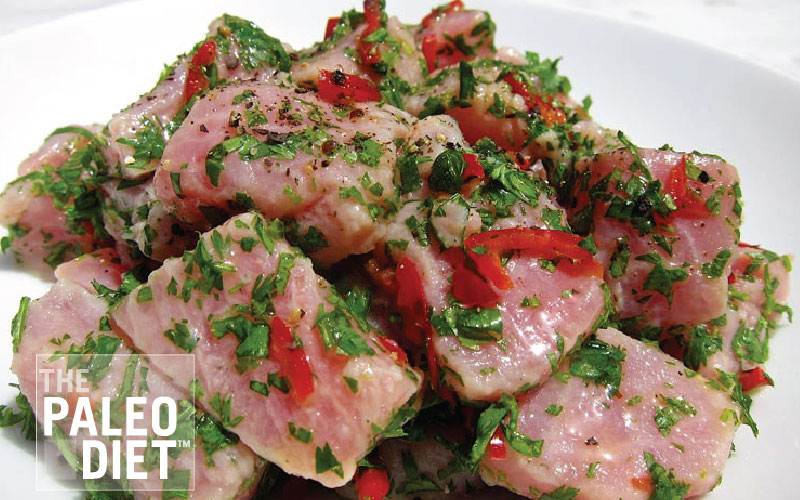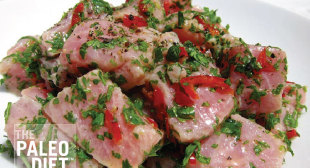Ginger Tuna Ceviche, The Health Benefits of Omega-3

The health benefits of omega-3 fatty acids, particularly the DHA and EPA varieties, are well documented and becoming well known.1
An estimated 17 percent of US adults consume fish oil supplements and since 2007, US fish oil sales have surged from $425 million to over $1 billion.2,3
While these figures are encouraging, more attention should be placed on omega-3 quality.
Because of their unique molecular structures, polyunsaturated fatty acids, including omega-3, are prone to oxidation.4
Heat, light, and oxygen can quickly degrade them, giving rise to harmful free radicals. Fish oil products vary considerably, but excessive oxidation is not uncommon.5
In general, whole fish provides better quality (less oxidized) omega-3 than extracted fish oils.
Taking it one step further, raw fish provides better quality omega-3 than cooked fish.
This doesn’t mean cooked fish is bad, but when raw fish opportunities present themselves, you shouldn’t hesitate.
When your local supermarket has ultra-fresh tuna, mackerel, or wild salmon, for example, buy some and prepare a simple, delicious ceviche.
Ceviche hails from the coastal regions of Central and South America.
Recipes vary, but most feature fresh fish, shrimp, squid, or other seafood marinated in citrus juices.
Our recipe works for fatty fish and whitefish alike, but the kick of ginger pairs especially well with tuna.
If you’re making ceviche with a stronger-tasting fish like mackerel, you’ll want to add some diced onions and possibly forgo the ginger.

Ginger Tuna Ceviche
Ingredients
Method
- Ginger doesn’t look very juicy, but looks can be deceiving. It has lots of juice and extracting it requires nothing more than a simple box grater.Just make sure your grater has small holes like the one pictured below.Grate the ginger against the small holes (the big ones won’t work) and delicately gather it in your hand.Squeeze firmly, catching the juice in a bowl below. A dry pulp will remain in your hand. Discard it or use it for tea.
- Put the tuna, chili, and finely chopped herbs into a mixing bowl.
- Stir the lime juice into the ginger juice.
- Pour this juice mixture over the other ingredients and stir well.It’s ready to serve immediately, but can reasonably sit for another 30 minutes.If you plan to eat much later, wait until the last moment to stir in the juices.
- Before serving, drizzle with olive oil and top with freshly ground black pepper.
References
1. Swanson, D., Block, R., & Mousa, S. A. (2012). Omega-3 Fatty Acids EPA and DHA: Health Benefits Throughout Life. Advances in Nutrition, 3(1), 1-7. doi:10.3945/an.111.000893
2. American Oil Chemists’ Society (AOCS). Omega-3 fatty acids: $13 billion global market. Retrieved June 6, 2014 from https://www.aocs.org/Membership/FreeCover.cfm?itemnumber=17629
3. Doyle, K. (2013, December 16). Fish oil sales don’t reflect the evidence. Reuters. Retrieved June 6, 2014, from https://www.reuters.com/article/2013/12/16/us-fish-oil-sales-dont-reflect-evidence-idUSBRE9BF1DH20131216
4. Albert, B., Cameron-Smith, D., Hofman, P. L., & Cutfield, W. S. (2013). Oxidation of Marine Omega-3 Supplements and Human Health. BioMed Research International. (2013). Retrieved from https://dx.doi.org/10.1155/2013/464921
5. Halvorsen, B. L. & Blomhoff, R. Determination of lipid oxidation products in vegetable oils and marine omega-3 supplements. Food & Nutrition Research, 55, doi:10.3402/fnr.v55i0.5792